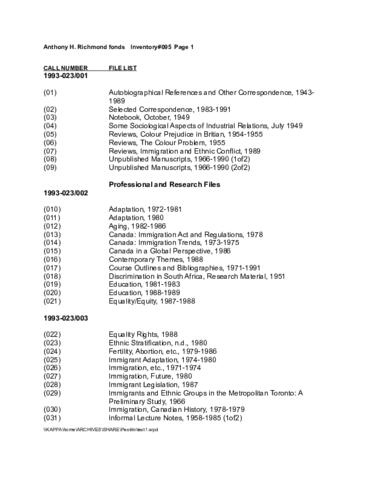Zona do título e menção de responsabilidade
Título próprio
Anthony Richmond fonds
Designação geral do material
- Documento textual
Título paralelo
Outra informação do título
Título e menções de responsabilidade
Notas ao título
Nível de descrição
Fundos
Entidade detentora
Código de referência
Menção de edição
Menção de responsabilidade da edição
Menção da escala (cartográfica)
Menção da projecção (cartográfica)
Menção das coordenadas (cartográfico)
Menção da escala (arquitectura)
Autoridade emissora e denominação (filatélica)
Zona de datas de criação
Data(s)
Zona de descrição física
Descrição física
1.2 m of textual records
Título próprio do recurso continuado
Títulos paralelos das publicações do editor
Outra informação do título das publicações do editor
Menção de responsabilidade relativa ao editor do recurso contínuo
Numeração das publicações do editor
Nota sobre as publicações do editor
Zona da descrição do arquivo
Nome do produtor
História biográfica
"Anthony (Tony) Richmond, professor emeritus at York University and one of the founders of York’s Department of Sociology. Richmond was born in Ilford, England. At the age of 18, he earned a scholarship to the London School of Economics (LSE), which he deferred until the end of the war. He joined the Friends Ambulance Unit in 1943 and served in hospitals and citizens’ advice bureaux in London, as ill health prevented him from serving abroad. After earning his BA at the LSE, Richmond began a master’s degree at Liverpool University, studying the city’s community of West Indian workers.
His first job was as a lecturer in social theory in the Department of Social Study at the University of Edinburgh, during which he published his first book, The Colour Problem (1955). The second edition of this book, published in 1961, included a new chapter on apartheid in South Africa, and brought him his first international recognition, stirring considerable controversy. His critical account had him and the book banned in South Africa until the country’s first free elections in 1994.
After a short spell at the Bristol College of Advanced Technology, he received his PhD from the University of London in 1965, and moved to Toronto with his wife, Freda, and young daughter, Catriona, and became a founding member of York’s Department of Sociology. Shortly afterward, he established the department’s graduate program and served as its first director. He also served as the director of York’s Institute of Behavioural Research (now the Institute of Social Research) from 1979 to 1983. In 1980, he was elected a Fellow of the Royal Society of Canada. He was active in recruiting the next cohort of young sociologists to the department from Britain, the U.S. and Canada.
At York University, he pursued studies of immigration and immigration policy, ethno-cultural assimilation and the comparative study of immigrant and ethnic communities. He was the author of 10 books and 17 book-length monographs, over two dozen book chapters, more than 60 referred articles, and many other invited papers and commentaries.
Richmond served on many departmental and university committees, especially in York’s formative years, including a President’s Task Force on the Role & Development of Research and the Faculty of Arts Academic Planning & Policy Committee. He retired in 1989. The Blishen-Richmond Award, named for two of the Department of Sociology’s distinguished retirees, is presented annually to outstanding honours sociology graduates.
Richmond was a deeply committed public intellectual. His work on immigration and immigrant assimilation influenced the revisions of Canadian federal immigration policy in the 1960s and early 1970s. He had a lifelong commitment to research on racism, publishing pioneering studies, and placing racialization at the centre of his research on immigrant and refugee diasporas. His last book, Global Apartheid: Refugees, Racism and the New World Order(1994), returned to themes that ran throughout his work, arguing that late 20th century mass migrations and refugee movements were being met with a form of global apartheid as North America, Europe and Australasia instituted repressive policies to restrain the movements, largely treating them as threats to their territorial integrity and privileged lifestyles. He was a founding member of the York Centre for Refugee Studies in which he actively participated after his formal retirement, publishing several articles, including his last in 2008 in the journal Refuge."
História custodial
Âmbito e conteúdo
Fonds consists of professorial records and includes his research files and personal files.
Zona das notas
Condição física
Fonte imediata de aquisição
Organização
Idioma do material
Script do material
Localização de originais
Disponibilidade de outros formatos
Restrições de acesso
No restrictions on access.
Termos que regulam o uso, reprodução e publicação
Instrumentos de descrição
A PDF file list is attached to this description.
Instrumento de pesquisa gerado
Materiais associados
Ingressos adicionais
The fonds comprises the following accession: 1993-023. Further accruals are expected.
Identificador(es) alternativo(s)
Zona do número normalizado
Número normalizado
Pontos de acesso
Pontos de acesso - Assuntos
Pontos de acesso - Locais
Pontos de acesso - Nomes
Pontos de acesso de género
Zona do controlo
Estatuto
Final
Nível de detalhe
Completo
Datas de criação, revisão ou eliminação
2002/04/08 date of creation
2003/04/09 date of last revision in ESS
2018/03/28 KCP. manually migrated to AtoM
2019/02/19 J. Grant. Added PDF file list.


